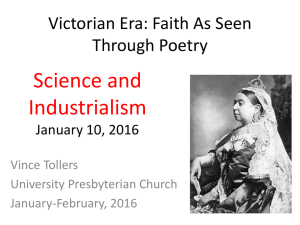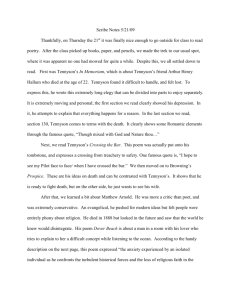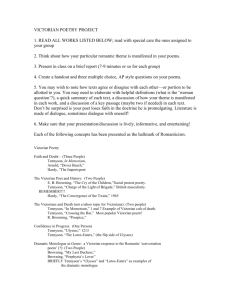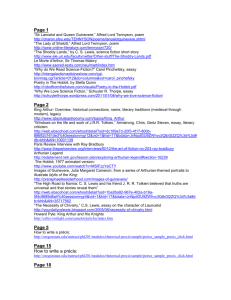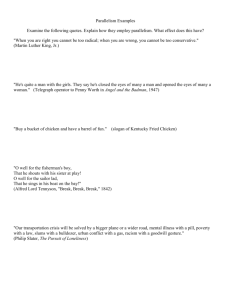Locksley Hall (1842) - University Presbyterian Church
advertisement
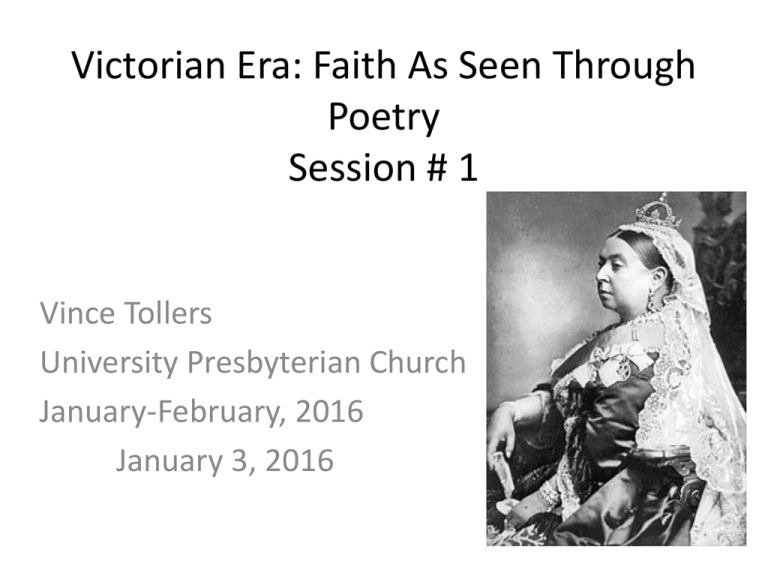
Victorian Era: Faith As Seen Through Poetry Session # 1 Vince Tollers University Presbyterian Church January-February, 2016 January 3, 2016 Challenging Changes • Religious Reforms – Anglicans: Oxford Movement – Roman Catholicism legalized – Explosive growth of Protestantism – Religious studies • Science • Industrialization – Social justice • War Why Literature? • Public looked to Tennyson, Dickens, and other writers to answer large, new questions of the Era • Poetry focused—easier to cover in these sessions • Explosive publication of poetry, essays, and novels Purpose of Literature to Victorians To teach and delight I was once a graduate student in Victorian literature, and I believe as the Victorian novelists did, that a novel isn't simply a vehicle for private expression, but that it also exists for social examination. I firmly believe this. Margaret Atwood Scheduled Topics • • • • • • • January 3 January 10 January 17 January 24 January 31 February 7 February 14 Introduction and Change Science Education God and Christ Nature Sense of self Romance/love (St. Valentine’s Day) Background • Monarchs • Leading characteristics • Dateline of poets and novelists Monarch and Events Victoria: 1937-1901 1830–48: stressful growth--first railways and Reform Parliament 1848–70: prosperity, optimism, and stability 1870–1901: breakdown of internal and external compromises Edward VII: 1901-10 1901-19 modernism meets indolence and indifference George V: 1910-36 WWI (1914-19) Old World ends Victoria and Albert Mourning Widow At 21, Victoria married her cousin Albert and bore him 9 children—all of whom assumed thrones across Europe. When Albert died at age 42, she mourned him for the next 40 years— setting a somber official tone. Edward VII and George V •Edward, the 2nd longest monarch in waiting •George, reigned through WWI Edwardian and Georgian Times (1901-19) • Rise of women and working class • Great economic disparity—social unrest • Foreign threats to “sun never sets on British Empire” • WWI ended this leisured world for the wealth – “Downton Abbey” – “Upstairs, Downstairs” Leading Characteristics of the Age Famous Quotes “Ah, but a man’s reach should exceed his grasp, or what’s a heaven for?” (Browning) “'Tis better to have loved and lost than never to have loved at all” (Tennyson) “The history of the world is but the biography of great men” (Carlyle) “The best which has been thought and said” (Arnold) English Churches Central to Industrialism James Watts’ steam engine 1775 Morals and Manners— Romanticism, Realism, and Naturalism Morality Continues Today Transitions of Types • Romanticism (1830s-70s) gave way to Realism (after 1870s) and Naturalism (after 1880s) – Morality and “the ideal” less popular – Coarser, fuller treatment of life – New topics considered openly, e.g., • • • • Colonialism The Woman Question Lower class life Sexuality Romantic View Domestic Bliss: “Angel in the House” I worshipp'd Kate with all my will. In idle moods you seem to see A noble spirit in a hill, A human touch about a tree. Coventry Patmore Realistic View Domestic Horror Repulses Readers In the preface to Jude the Obscure (1895), Thomas Hardy writes: “For a novel addressed by a man to men and women of full age; which attempts to deal unaffectedly with the fret and fever, derision and disaster, that may press in the wake of the strongest passion known to humanity [as in sexuality], and to point, without a mincing of words, the tragedy of unfulfilled aims, I am not aware that there is anything in the handling to which exception can be taken.” Naturalistic, Sometimes Crude View • T The Victorians— of all classes— were sexier than is generally assumed. Major Writers and Genres • Poetry and fiction flourished – New readers, new subjects, new outlets – First financially successful: Scott, Dickens, Tennyson • After 1880s, New Theatre flourishes: Ibsen, Shaw, Wilde – Stage filled with bawdry, burlesques, reviews William Blake 1757 1827 Elizabeth Barrett Browning 1806 1861 Alfred, Lord Tennyson 1809 1892 Edward Fitzgerald 1809 1883 Charles Dickens 1812 1870 Robert Browning 1812 1889 George Eliot 1819 1880 Matthew Arnold 1822 1888 Dante Gabriel Rossetti 1828 1882 Christiana Rossetti 1830 1894 James Thomson 1834 1882 Edward Swinburne 1837 1909 Thomas Hardy 1840 1928 Gerard Manley Hopkins 1844 189 Henley 1849 1903 Robert Louis Stevenson 1850 1894 Oscar Wilde 1854 1900 Francis Thompson 1857 1907 A. E. Housman 1859 1936 William Butler Yeats 1865 1939 Rudyard Kipling 1865 1936 T. S. Eliot 1888 1965 Wilfred Owens 1893 1918 W. H. Auden 1907 1973 Scheduled Topics • • • • • • • January 3 January 10 January 17 January 24 January 31 February 7 February 14 Introduction and Change Science Education God and Christ Nature Sense of self Romance/love (St. Valentine’s Day) Change When you are a kid, you think nothing will change. When you are old, you think nothing should change except in retrograde. In between lots of us want to be the change. Art Menius Chapel Hill News November 25, 2015 Victorians and Modern US Patterns • Population explosion • Migration from farms to cities • Industrialization/Technological/scientific advances – Changing sense of time • Religion not meeting new needs England: 1740-2011 • Population (in millions) 1740 1800 1851 6 10 17 1901 31 2011 63 Increased population and the Enclosure Acts led to massive rural to urban migration US: Today vs 1940 • Population: total: (2014): 318 m; (1940): 132 m – Rural/urban: (2014): 2% Lowest since 1850 – Southern Diaspora and Depression drove Americans to urban centers US Parallel: Today vs 1940 • Technology – Cellphones (1983); Phones: (1940)25% • Education – High school (2014): 91%: 1940: 50% – College (2014): 34% 1940: 6% (urban) 1.3% rural-farm View of Time Shapes Our Response – Personally – Religiously – Nationally – Cosmically Views of Jesus Change Over Time • 5th-6th C BC • 2nd C AD • 17th C • 19th C • 1980s > Jewish writers shape Genesis 1 & 2: creation stories tell their history Christian writers reshape stories to make Jesus central Theologians: Life starts at evening on Saturday, October 22, 4004 BC. (Bishop Ussher of Armitage, Ireland) European Scholars Search for historical Jesus as a man Jesus Seminar: Jesus vs myths Knowledge Leads to Change • Various religious emphases—focus on God, Jesus, Mary • Languages—clearer meaning • Archaeology—great finds • History—view of time determines expectations • Methodology—questions determine answers – Scientific approach: great advances in 19th C Victorians on Time/Change/Faith • Alfred, Lord Tennyson (1842) • Matthew Arnold (1849) • Thomas Hardy (1890s-1900) • William Butler Yeats (1919) Causes/Types of Change • Great people (Carlyle) • Progression of events/ scientific principles (Tennyson and Buckle/Green) • Cyclical (Arnold and Yeats) • The gods (Hardy) Turning to the Poets Alfred, Lord Tennyson (1809-92) •Locksley Hall (1842) – Faith in future •Ulysses (1842)- Life of action Locksley Hall (1842) • Jilted by Amy, who married a loutish wealthy lord, the poem seeks then rejects solace in – Nature – Escape to an island paradise • Has faith and hope in an orderly progression of events Locksley Hall (continued-1) For I dipt into the future, far as human eye could see, Saw the Vision of the world, and all the wonder that would be; Saw the heavens fill with commerce, argosies of magic sails, Pilots of the purple twilight dropping down with costly bales; Heard the heavens fill with shouting, and there rain'd a ghastly dew From the nations' airy navies grappling in the central blue; Far along the world-wide whisper of the south-wind rushing warm, With the standards of the peoples plunging thro' the thunder-storm; Till the war-drum throbb'd no longer, and the battle-flags were furl'd In the Parliament of man, the Federation of the world. There the common sense of most shall hold a fretful realm in awe, And the kindly earth shall slumber, lapt in universal law. Locksley Hall (continued -2) So I triumph'd ere my passion sweeping thro' me left me dry, Left me with the palsied heart, and left me with the jaundiced eye; Eye, to which all order festers, all things here are out of joint: Science moves, but slowly, slowly, creeping on from point to point: Slowly comes a hungry people, as a lion, creeping nigher, Glares at one that nods and winks behind a slowly-dying fire. Yet I doubt not thro' the ages one increasing purpose runs, And the thoughts of men are widen'd with the process of the suns. What is that to him that reaps not harvest of his youthful joys, Tho' the deep heart of existence beat for ever like a boy's? Knowledge comes, but wisdom lingers, and I linger on the shore, And the individual withers, and the world is more and more. Knowledge comes, but wisdom lingers, and he bears a laden breast, Full of sad experience, moving toward the stillness of his rest. Locksley Hall (continued – 3) The poet rejects escaping to the Orient and places his faith in the Mother-Age Mated with a squalid savage—what to me were sun or clime? I the heir of all the ages, in the foremost files of time— I that rather held it better men should perish one by one, Than that earth should stand at gaze like Joshua's moon in Ajalon! Not in vain the distance beacons. Forward, forward let us range, Let the great world spin for ever down the ringing grooves of change. Thro' the shadow of the globe we sweep into the younger day; Better fifty years of Europe than a cycle of Cathay. Mother-Age (for mine I knew not) help me as when life begun: Rift the hills, and roll the waters, flash the lightnings, weigh the Sun. O, I see the crescent promise of my spirit hath not set. Ancient founts of inspiration well thro' all my fancy yet. Howsoever these things be, a long farewell to Locksley Hall! Ulysses (1842) • The hero, away at the Trojan Wars, etc. for 20 years, returns to his wife and son. • Restless with the tame world “that knows not me,” Ulysses sets out with his men “to sail beyond the sunset…until I die.” I cannot rest from travel: I will drink Life to the lees…. Death closes all: but something ere the end, Some work of noble note, may yet be done, Not unbecoming men that strove with Gods. ….Come, my friends, 'T is not too late to seek a newer world. Push off, and sitting well in order smite The sounding furrows; for my purpose holds To sail beyond the sunset, ….Tho' much is taken, much abides; and tho' We are not now that strength which in old days Moved earth and heaven, that which we are, we are; One equal temper of heroic hearts, Made weak by time and fate, but strong in will To strive, to seek, to find, and not to yield. Next Week: Science and Industry
